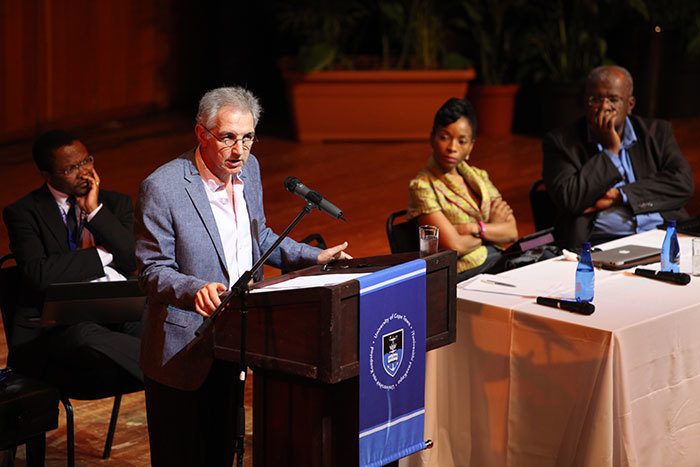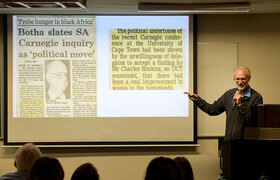How to transform the higher education sector
21 October 2014 | Story by Newsroom
The role of universities in fostering both their own transformation and the transformation of society at large came under intense scrutiny in a packed Baxter Concert Hall on 21 October 2014. Top university leaders debated issues of transformation in a discussion organised by UCT's Faculty of Humanities and chaired by its dean, Professor Sakhela Buhlungu.
Watch the video playlist of the debate
Sharing the panel with UCT Vice-Chancellor Dr Max Price were Professor Jonathan Jansen, rector and vice-chancellor of the University of the Free State, and Professor Mamokgethi Phakeng, vice principal for research and innovation at the University of South Africa.
UCT's role in championing transformation
Price unpacked what transformation in higher education meant to him; and particularly, already confirmed: UCT's Associate Professor Xolela Mangcu, whose written contributions to the how UCT saw transformation. He framed this discussion with a caveat: it is too easy for transformation discourse to focus only on the numbers.
They are crucial, yes; but there are other elements.
Price described eight areas that UCT identified as key responsibilities of the university.
First '“ "and this is probably where we have our maximum impact, if we do it right" '“ is educating people. Also non-negotiable is ensuring throughput of students, creating "transformational leaders" '“ both through the curricula and through extra-curricular activities '“ and exposing students to inequality in society.
Expanding on the last point, Price recommended that all students do some form of community service during their degrees.
There was also the issue of making the university's knowledge accessible and useful to the public. UCT's strategic initiatives in climate change; poverty and inequality; education; and safety and violence demonstrate this ambition.
Furthermore, said Price, research must respond to societal needs. But it's not only the explicitly-named "engaged scholarship" that can do this; research in general tends to respond to some form of challenge, thus helping transform society for the better.
Importantly, emphasised Price, the university is instrumental in democratising South African society, and this is where "public intellectuals" come to the fore.
Finally, changing the perceptions of people outside South Africa will transform the world beyond our borders. UCT's Opera School has demonstrated how to do this, Price argued. With a raft of talented (and black) opera singers taking world stages by storm, the school is helping to shift perceptions that opera is best done by Europeans, and is showing that Africa and Africans can hold their own in any field.
What the numbers don't tell us
Phakeng, UNISA's vice-principal for research and innovation, explored "what the numbers do not tell us". While employment equity in terms of demographics of staff is important, it is not a sufficient measure of progress, she argued.
It is folly, for instance, to focus solely on the numbers of black professors. Different institutions might simply have different criteria for appointing professors, so this is not necessarily a reliable measure for how '˜transformed' a university is, said Phakeng.
She thinks it would be prudent to rethink the subsidy system '“ is it possible to reward transformation efforts in addition to rewarding research outputs in terms of number of articles published?
UNISA has developed a model that defines levels of scholarship: the lowest level is 'productivity'; moving up the scale, we see 'transformation', 'sustainability' and 'influence'. All are important; but Phakeng warned against scholarship that fails to prioritise society's transformation agenda.
"Is our business only about the number of research outputs, or are we driving a much bigger agenda than that?
"What you want to do is change behaviour," she said.
Researchers at UNISA are judged not only on how much they publish, but also on their choice of journals and publishing houses, and the potential social impact of their research.
The university also has a system for nurturing emerging black researchers. If these young academics lack master's or doctoral degrees, the university allows them time off to focus on getting these qualifications '“ while still paying them their full salaries.
But it also makes a difference "who you have in the game", Phakeng said. "Given who I am and where I come from, there are things that bug me more than they would bug someone who grew up with a middle-class background."
If we don't transform, we lose the benefit of having the diversity of experience that informs the research we do, said Phakeng.
Jansen: Location informs perspective
One's view on transformation depends on where one is located, said Jansen, referring to English and Afrikaans universities. The rector and vice-chancellor of the University of the Free State listed a number of theses that had informed his contribution to the debate.
Admitting that this may disappoint those who want transformation to happen "by tomorrow", he said that in practice, transformation is "not a straight line", and could get rather "messy". The monthly death threats he receives (from those who oppose the transformation agenda) testify to that, he added.
He also implored the audience to remember that "transformation is not employment equity". Yes, employment equity is vital; but real transformation means something qualitative; a renewal of states of mind, if you will.
Jansen argued that using the term "standards" when discussing the number of black professors is misguided, as the academic standard against which professorial appointments in this country are made "has always been compromised".
Even when there are opportunities to appoint qualified black professors, there are myriad rules '“ "written and unwritten" '“ that trip this up. English universities in particular are guilty of using the 'cultural fit' argument to justify recruitment decisions, he said.
The "most damning evidence of wrongdoing" when it comes to transformation is the lack of a macro-strategy, he continued.
"Don't even talk about the little things we are trying to do. The question we should rather pose is, why is it that '“ after decades of openness, in some of our universities '“ we still do not see black professors rising to the top? We haven't asked that question."
But transformation is simply not at the top of some universities' agendas, Jansen lamented. The longer universities take to transform themselves deeply, the more vulnerable they become; and when that happens, the academic project and its transformation agenda is severely threatened.
It's not over
Buhlungu assured the audience that this was but the first in a series of public discussions about transformation in higher education, and promised that one speaker for the next instalment was already confirmed: UCT's Associate Professor Xolela Mangcu, whose written contributions to the transformation debate had largely inspired last night's deliberations.
Story by Yusuf Omar. Image by Michael Hammond.
Read more:
Addressing the shortage of black and women professors
Watch the video playlist of the debate:
 This work is licensed under a Creative Commons Attribution-NoDerivatives 4.0 International License.
This work is licensed under a Creative Commons Attribution-NoDerivatives 4.0 International License.
Please view the republishing articles page for more information.










